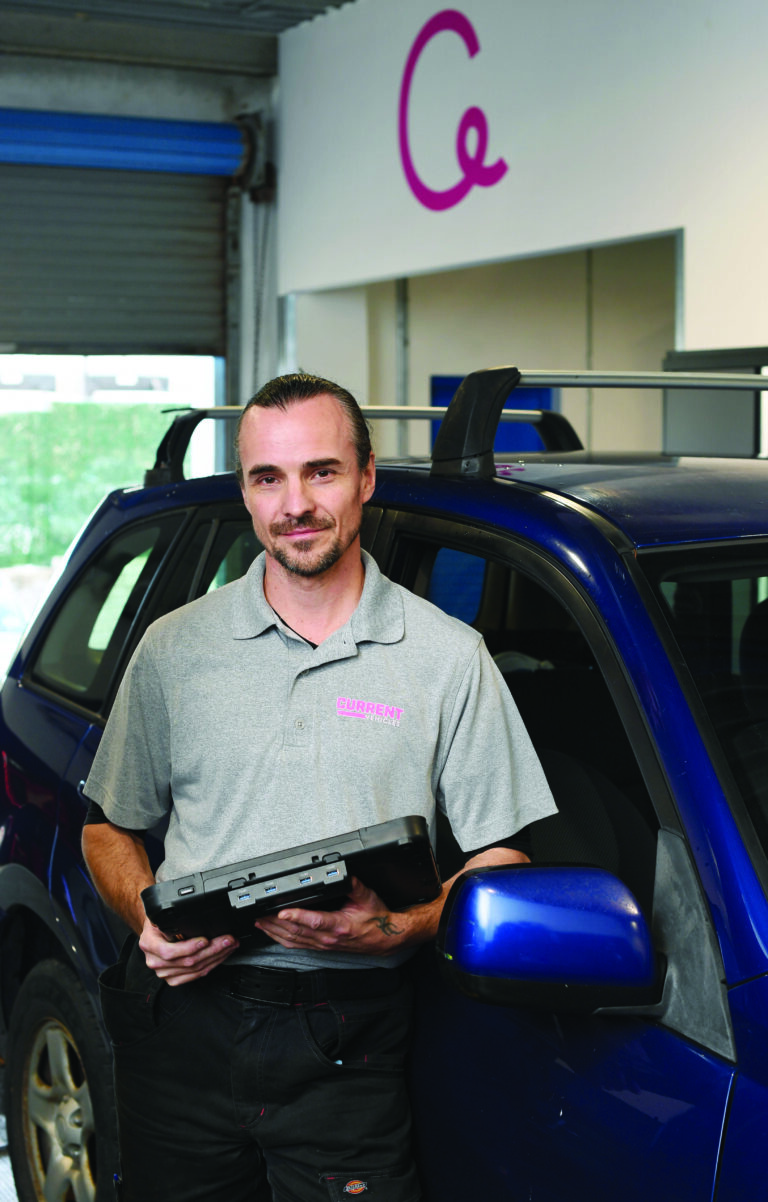Older people are retiring, there are fewer young people who are interested – not a surprise then that the industry is struggling to keep pace.
Darrel Mellor, the co-owner of Current Works, stumbled onto the job. He was studying business in England when he was assigned to the offices of a garage as part of his work placement.
“I just got more interested in terms of what was happening in the garage: hanging out with the guys and seeing what was going on. I didn’t know anything about cars when I got into it. It was just solving problems, fixing things, pretty much like a grown-up version of Lego I guess.”
With his interest piqued, he enrolled in “a structured modern apprenticeship”, an option he wishes was available here.
“This is the problem. It’s something Bermuda doesn’t have,” said Mr Mellor, who is City & Guilds qualified and a certified advanced automotive engineer.
“In the UK you go to a college and they find you a workplace. So I spent four days a week working in a garage and one day a week at college learning the theory behind it all.”
In the garage, there was a flow chart that tracked his work, ensuring specific targets were met.
“Basically in the industry you can decide where you want to go. You can stay at the level of just being a tyre fitter or you can drive forward and become a diagnostic technician, something that’s more complex. Just like in a hospital where you have your nurses, your doctors and surgeons, there’s different levels of where you can get to.”
For Mr Mellor, the more he learnt, the more he wanted to know. As such, he began working on electric vehicles long before they were a common sight on Bermuda’s roads. He is a certified electric/hybrid vehicle technician with credentials from Renault, Mercedes-Benz, Chrysler, Jeep, Kia and Citroen.
“The EVs, over the last few years – people have been taken by surprise because there aren’t really trained technicians to deal with them. They’re coming onto the market faster than the workforce can keep up with. The older people in the trades are retiring or getting away from it and you’re getting fewer younger people coming into the trade,” he said.
For a mechanic, staying ahead means working in what would otherwise be spare time. Mr Mellor takes online courses to prepare and then travels to the UK or the Caribbean at least once every two years for hands-on training and certification.
“You have to want it,” he said. “A lot of people go to work for 40 hours a week, go home at night and just watch TV or something.
“When I worked in the UK it was easier because courses were local. I worked in dealerships and they would send you on training. Here in Bermuda I used to work for Eurocar and they would send me on training. But then once I went into what’s called ‘the aftermarket’ and then eventually opened up my own business, I had to source all of that myself and pay for it myself. Now I have my own company and the company pays for it.”
Current Works was created through a partnership with Piers Carr in 2020. The range of offerings is more diverse than some might think. It services Current Vehicles’ fleet of Twizys, small electric cars that are available for hire, out of a full-service garage that is also open to the public.
“I designed the structure pretty much like a hospital where you have your junior technicians and then your more senior technicians and your diagnostic technicians,” Mr Mellor said.
“Complex diagnostics are done by the more experienced technicians and then the other work is passed on to the junior technicians.”
Junior technicians have the benefit of in-house training with the idea to “level them up”.
There are six people on staff.
“In the beginning it was difficult because it was a start-up but our reputation is growing, people are hearing about us and it’s a great place to work with a good environment. So now we’re reaching out to get more staff but the hardest part is obviously qualified Bermudians because there’s no structured pathway in Bermuda for this industry. So most people have to go overseas to get their initial qualifications.”
At Current Works, technicians start at “level one” and must commit to online training courses and work that becomes progressively more difficult.
For anyone training to become an electric technician, the first two levels will be mostly dedicated to recognising the dangers: the health and safety measures essential for work on a high voltage system.
“There are a lot more risks involved. Making the wrong move can result in death. You have to know what to focus on, making sure you know what to deal with before you go anywhere near it,” Mr Mellor said.
“We have the appropriate equipment and PPE for working on those. Obviously it’s a different technology. You still have your brakes and suspension, windscreen wipers and regular things, but the whole drive system is completely different. It does take an extra level of training.”
As there is a shortage of mechanics worldwide, it is a great career opportunity for young people, he added.
“A lot of youngsters today just want to go into IT or social media or whatever. We still need these people but without a dedicated programme in Bermuda to try and get people, it is difficult.”
As a workaround Mr Mellor is building an “apprenticeship and technician certification pathway” for Current staff.
“I work with the Institute of the Motor Industry in the UK, called the IMI, so we have an agenda to create our own so we can train people and give people qualifications in-house, but that’s further down the line.” n

